Latest MICROHOME competition winners pitch designs for modular off-grid living
By Josh Niland|
Friday, Aug 2, 2024
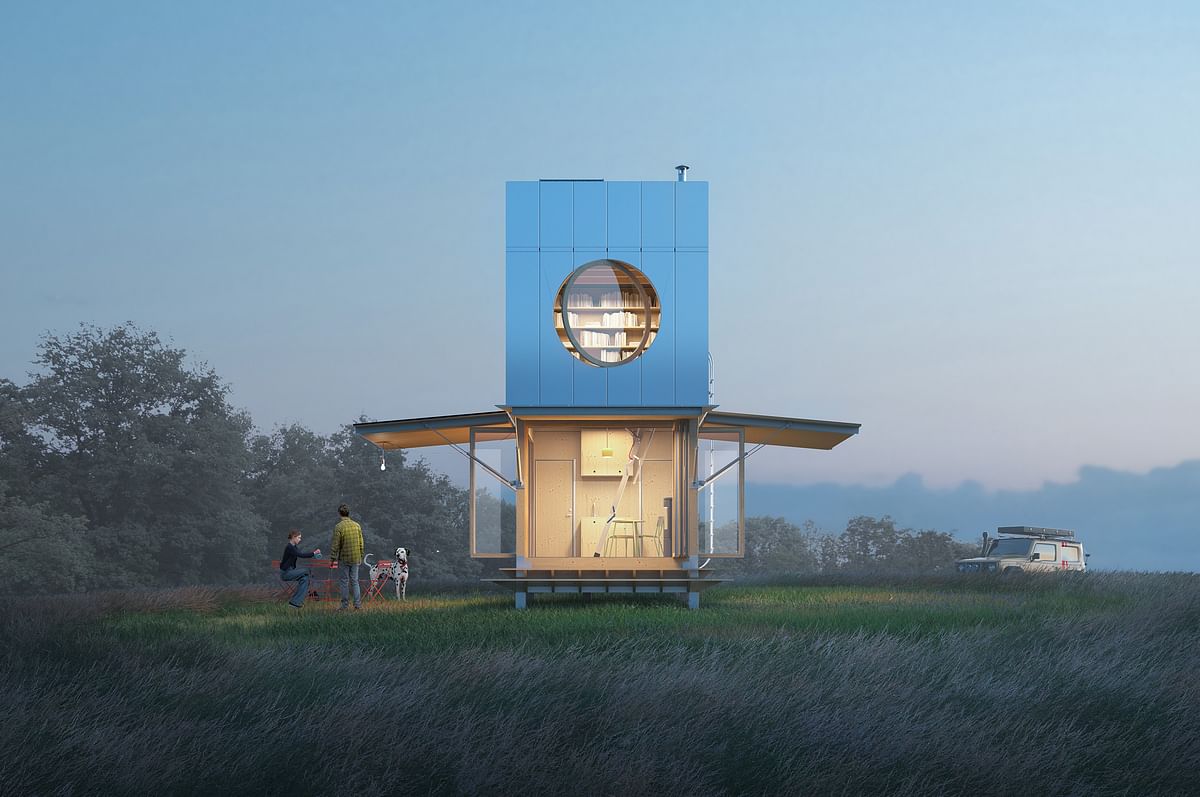
Related
The MICROHOME competition series has just wrapped up its seventh edition with winning designs presenting a mix of innovative solutions, social, and socio-economic concerns.
The challenge invited participants to conceptualize a modular, off-grid dwelling for a hypothetical young couple, limited to a total floor area of 25 square meters (269 square feet).
Participants were asked to focus on five key design considerations: Community Integration, Sustainability and Environmental Impact, Affordability and Accessibility, Adaptability and Scalability, and Educational and Social Awareness. "By focusing on these aspects, architects can contribute to creating functional and equitable housing solutions that meet current and future needs," organizer Buildner stated in its brief
Kingspan Award Winner: TOTEM
Designer: Alessandro Ghidini (Italy)
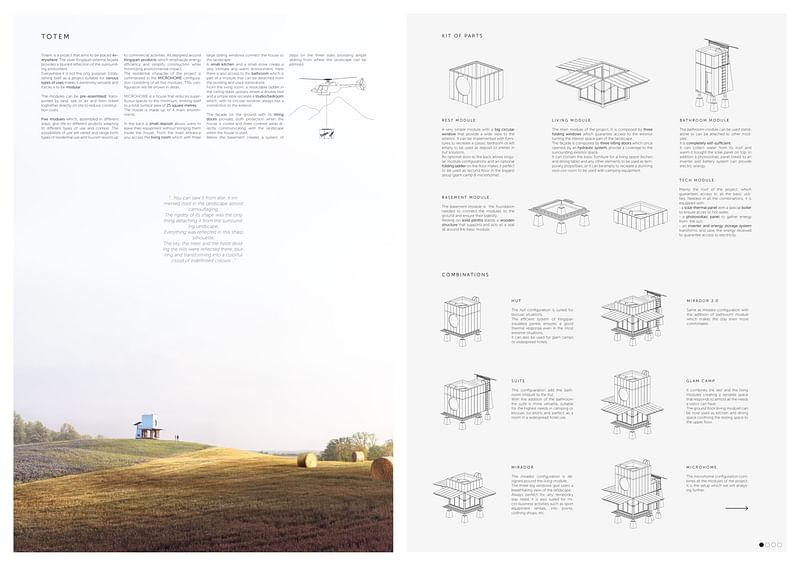
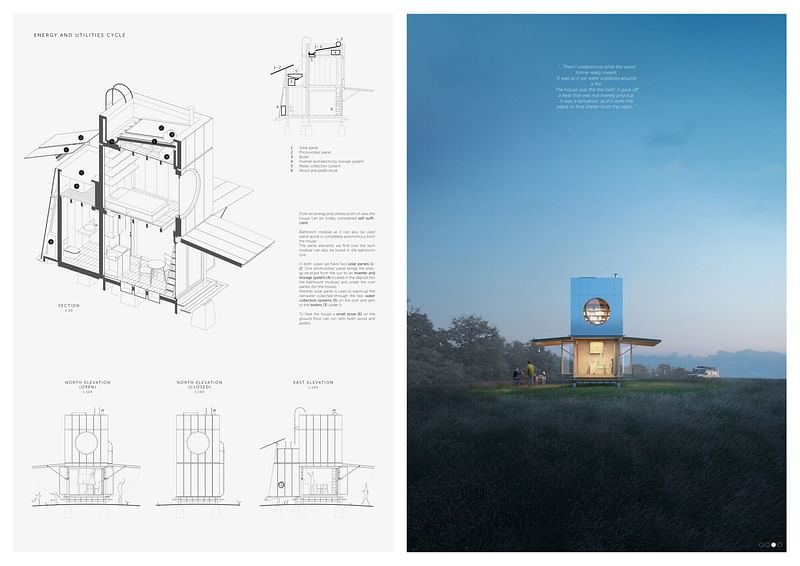
The jury says: "Totem is a versatile modular system designed for varied applications, from residential to commercial use. Its reflective silver Kingspan façade blends with its surroundings, offering a sleek, adaptable design. The project features five distinct modules — each transportable by land, sea, or air and easily assembled on-site, reducing construction costs. The MICROHOME configuration, a compact 25m² unit, includes four main areas: a small storage room, a living room with large sliding windows, a compact kitchen, and a bathroom module that can function independently. Upstairs, a retractable ladder leads to a studio/bedroom with a circular window for exterior views. The design also incorporates a basement module for stability and seating, and a tech module with solar panels for energy efficiency. Totem's modularity allows configurations such as huts, glam camps, and suites, making it a flexible solution for various needs and environments." Read the team's interview here.
1st Prize Winner: Urban Residential Pod
Designer: Daniel Rojas/Wandrian Studios (United States)
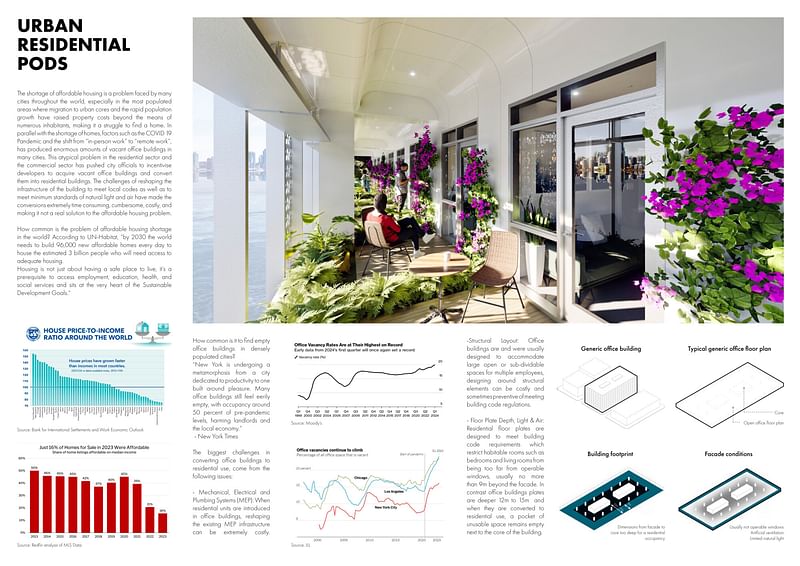
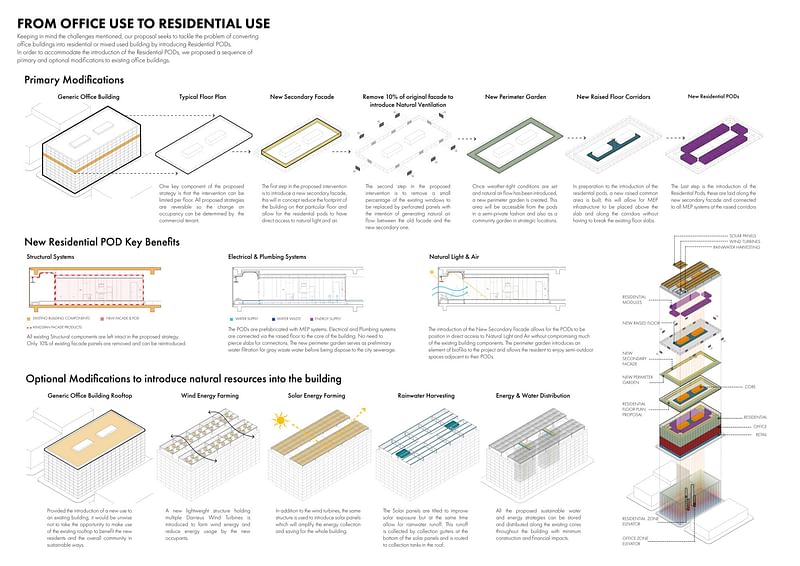
The jury says: "Urban Residential Pods addresses the global affordable housing crisis by repurposing vacant office buildings. Each POD aims to provide a compact yet comfortable living space for two adults, including essential amenities such as a bathroom, air conditioning, laundry station, storage, full kitchen, dining area, queen bed, and living room. The design also incorporates semi-private semi-outdoor space adjacent to each POD. A key innovation is the off-site construction system, allowing the POD components to be pre-fabricated, transported, and assembled easily within existing office buildings. This approach not only meets basic housing needs but also leverages unused urban spaces, offering a practical solution to both housing shortages and vacant commercial properties." Read the team's interview here.
2nd Prize Winner: Why is living in Hong Kong so exhausting?
Designers: Giorgio Maria Martellono, Luca Quadro, Chang Liu, and Jacopo Leccia (Italy)
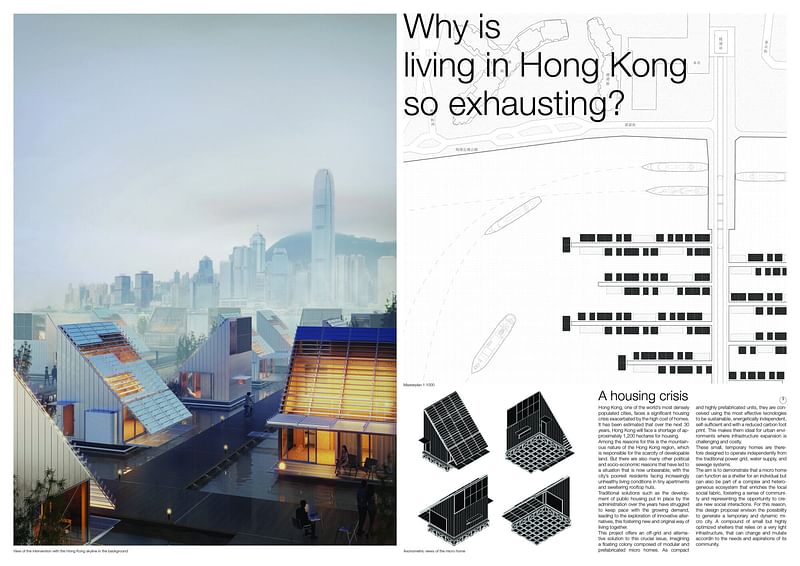
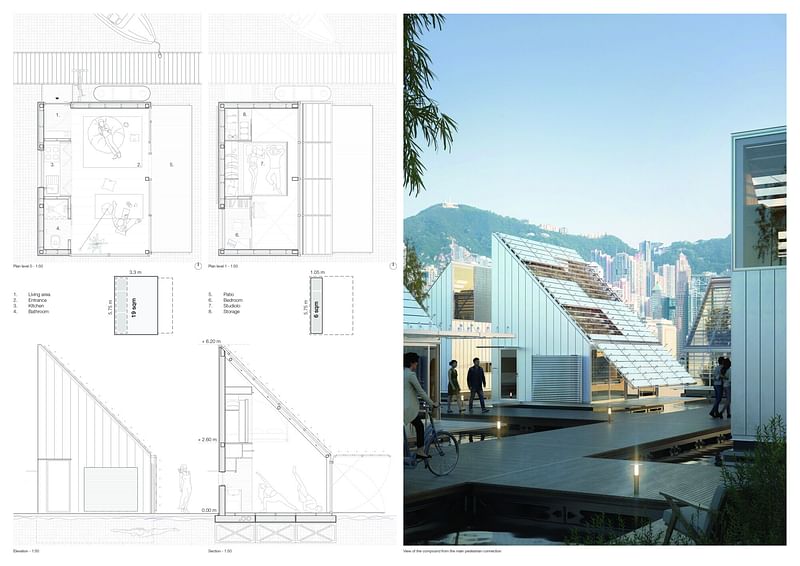
The jury says: "Hong Kong, grappling with a severe housing crisis due to high costs and limited land, is projected to face a shortage of around 1,200 hectares for housing in the next 30 years. The city's mountainous terrain and socio-economic factors have worsened living conditions, with many residents enduring cramped apartments and uncomfortable rooftop huts. Traditional public housing solutions have struggled to meet demand, prompting the search for innovative alternatives. This project proposes a floating colony of modular, prefabricated microhomes designed to be off-grid, sustainable, and energy-independent. These compact units operate without traditional infrastructure, making them ideal for urban settings where expanding infrastructure is costly. The design envisions a temporary, dynamic micro-city that enhances community interaction and adapts to the evolving needs of its residents, offering a novel solution to Hong Kong's housing dilemma." Read the team's interview here.
3rd Prize Winner: respira
Designer: ValentÍ Soler Casas (Spain)
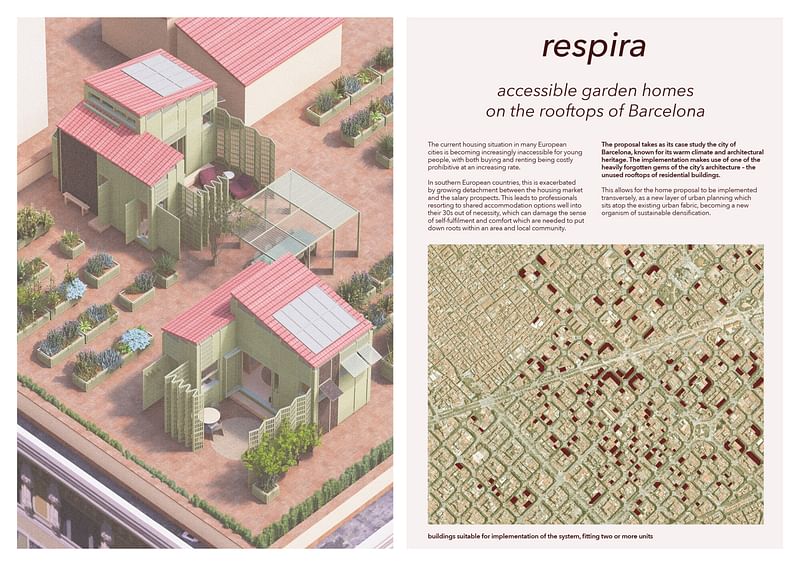
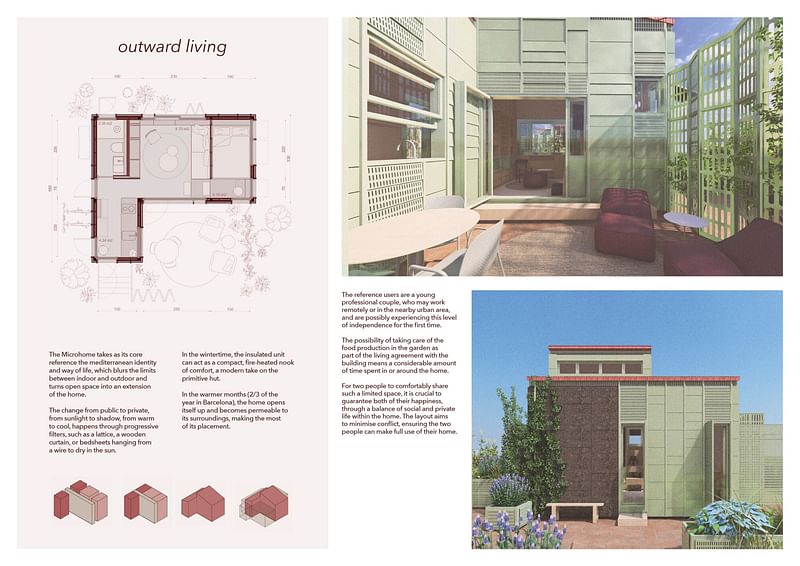
The jury says: "According to the proposal, Respira Accessible Garden Homes for Barcelona, housing affordability is increasingly out of reach for young professionals in many European cities, and this is exacerbated in Southern Europe by a disconnect between housing costs and salaries. This often forces individuals into shared accommodations, impacting their sense of comfort and community. The project addresses this issue in Barcelona by repurposing unused rooftops for garden homes. These modular units blend with the city’s architectural heritage and Mediterranean lifestyle, offering a new layer of urban planning. Designed to be both insulated for winter and open to the surroundings in warmer months, these homes blur the lines between indoor and outdoor living. Targeting young professional couples, the design includes private and communal spaces that balance social and personal needs. The rooftops not only provide affordable, low-energy housing but also enhance social and environmental sustainability. Occupants can manage rooftop gardens and solar panels, contributing to the building's energy efficiency and fostering community engagement." Read the team's interview here.
Student Award: Wavefront Living
Designers: Yoong Zheng Quan, Cheah Kim Hoong, Branda Wee, and Pang Jian Sheng of the Universiti Putra Malaysia
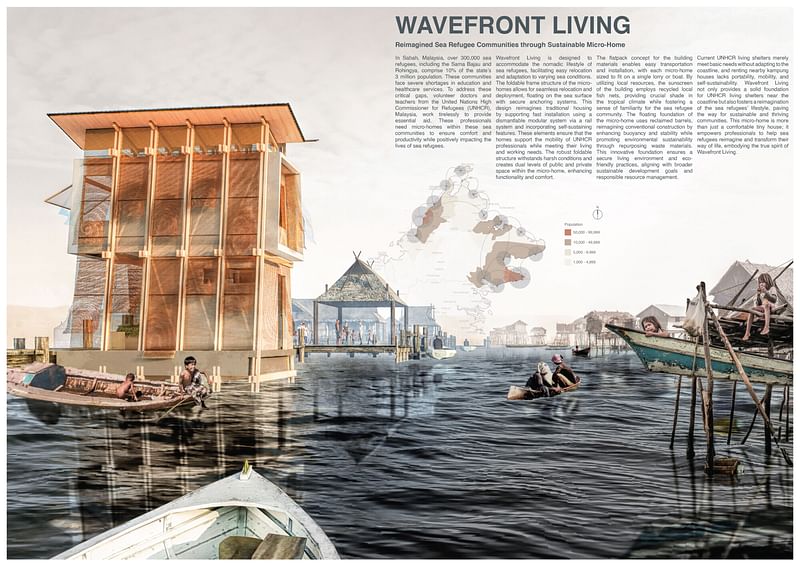
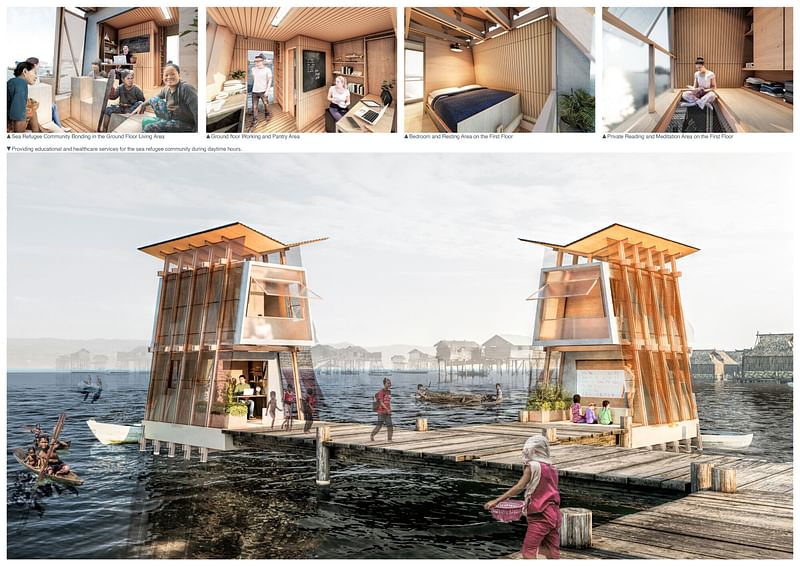
The jury says: "In Sabah, Malaysia, where over 300,000 sea refugees, including the Sama Bajau and Rohingya, face severe shortages in education and healthcare, traditional living solutions are inadequate. Wavefront Living addresses these needs with a reimagined approach to sea refugee housing. This innovative design features foldable, flatpack micro-homes that are portable and adaptable to varying sea conditions. Each unit, which can be transported by lorry or boat, is constructed using recycled fish nets for shade and reclaimed barrels for buoyancy. The modular system allows for rapid deployment and relocation, supporting UNHCR professionals and enhancing self-sustainability. By integrating local resources and environmental sustainability, Wavefront Living provides a robust, comfortable, and secure living environment that supports the nomadic lifestyle of sea refugees while promoting community well-being and efficient resource management." Read the team's interview here.
RELATED COMPETITION 150,000€ Kingspan's MICROHOME


Share
0 Comments
Comment as :